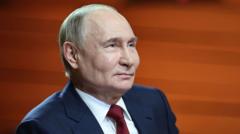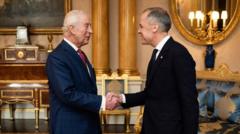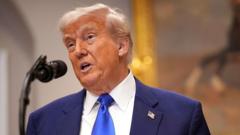In response to President Trump's threats to impose a 50% tariff on EU imports, EU Trade Commissioner Maros Sefcovic called for respect and collaboration in trade negotiations. Both sides face risks with their stances, as the EU warns tariffs would harm both economies.
EU Urges Negotiation Over Tariff Threats Amid Rising Trade Tensions with US

EU Urges Negotiation Over Tariff Threats Amid Rising Trade Tensions with US
The European Union emphasizes the necessity of mutual respect in trade talks with the US after President Trump's proposed tariffs cast uncertainty on the economic partnership.
The European Union's trade leadership is seeking a path forward in ongoing negotiations with the United States after President Donald Trump threatened to impose steep tariffs of up to 50% on EU goods. EU Trade Commissioner Maros Sefcovic, stressing the need for cooperative dialogue, stated that trade talks should be characterized by "respect" rather than coercive measures.
Trump's ultimatum came after he expressed frustration with the pace of negotiations. Commenting via social media, he indicated that there was a stalemate in discussions, prompting him to declare a readiness to move forward with tariff implementation as of June 1. Although Trump assures that no tariffs will apply to American-made products, he suggested that significant European investments in the U.S. might alter his approach.
The EU represents a major economic entity for the U.S., with trade exceeding $600 billion in exports and $370 billion in imports in the past year alone. In light of Trump’s statements, various European leaders have voiced concern, highlighting the detrimental impact of escalatory tariffs on both economies. Ireland’s Taoiseach (Prime Minister) Micheál Martin underscored the importance of constructive negotiations as the sole sustainable avenue, while France’s Trade Minister Laurent Saint-Martin reiterated a commitment to de-escalation.
Several European officials indicated a unified front; German Economy Minister Katherina Reiche proclaimed the necessity of engaging diplomatically with the U.S. Dutch Prime Minister Dick Schoof also acknowledged the fluctuating nature of tariffs in negotiations with the United States.
While the EU seeks to negotiate collectively as a bloc, experts like Stephen Moore from the Heritage Foundation suggest an individual negotiation strategy with EU nations may evolve. He acknowledged that efforts toward decoupling from Chinese market influence could be a strategic movement underlying Trump’s economic rhetoric.
Earlier this year, Trump had announced tariffs across various countries, including a 20% duty on EU goods, later suspended temporarily to allow for negotiations. The U.S. maintained tariffs against EU steel and aluminum imports and announced a baseline tax impacting American trade partners.
Similarly, the EU has reciprocated with threats of introducing its own tariffs against the U.S., valuing approximately $20 billion, although these plans have currently been stalled. With Trump's attempts to address what he claims is an imbalanced trade relationship—asserting that the EU exports more to the U.S. than it imports—uncertainty looms over the international markets as geopolitical tensions mount. Following the latest administration threats, stocks in both regions saw declines, signaling apprehension regarding potential economic repercussions.


















